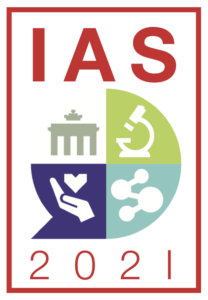IAS 2021: WHO report links HIV to 30% increased mortality from COVID-19: based on South African data
1 August 2021. Related: Conference reports, COVID-19: HIV and COVID-19 coinfection, COVID-19.
 Simon Collins, HIV i-Base
Simon Collins, HIV i-Base
On 15 July 2021, WHO published a 12-page report linking HIV to a higher risk of mortality in people hospitalised with COVID-19, based on a large international database. [1, 2]
The report was also the first study highlighted in a press conference for the upcoming IAS 2021 conference, due to run from 19 to 21 July, and as such was quickly picked up as headline news.
The results are from an WHO international database looking at outcomes of people hospitalised with COVID-19 submitted to the WHO Clinical Platform. Individual, anonymised data could be submitted using a case report form in various ways, either directly or locally, collecting results at baseline, during hospitalisation and at discharge/death.
This analysis was to describe the demographics, clinical presentation, clinical outcomes, and risk factors among people living with HIV who have been hospitalised for suspected or confirmed COVID-19.
From January 2020 to April 2021, the database collected more than 268,400 cases from 37 countries, with 24 countries including results about HIV.
Of these, 15,522 were HIV positive (9% of 168,649 cases – presumably the total records from the 24 countries with HIV data). The vast majority – more than 96% (14,914/15,522) – were from the WHO African Region, with 94% (14,682/15,522) from South Africa.
Within the HIV positive cohort, the mean age was 45.5 years, 37% (5737/15,442) were male, 91% (8842/9631) were on ART, and 36% (5613/15,522) had severe or critical illness on hospital admission.
Among the severe cases, 89% (5039/5611) were less than 65 years old and 39% (2187/5596) were male. Overall, the mean duration from hospital admission to death or discharge was 9.5 days (SD 13.4, n= 14,776).
Results: increased mortality in South Africa
Rates were higher for people with either two (aHR 1.40, 95% CI: 1.37 to 1.43) or three or more underlying conditions (aHR 1.50, 95% CI: 1.44 to 1.56), both p<0.0001.
Other significant risk factors included being >65 or older (aHR 1.82, 95% CI: 1.62 to 2.04), male (aHR 1.21, 95% CI: 1.15 to 1.28), having diabetes (aHR 1.50, 95% CI: 1.39 to 1.62) and hypertension (aHR 1.26, 95% CI: 1.19 to 1.34), all p<0.0001.
However, by geographic region, the link to mortality was not supported in the WHO European Region (aHR 0.59, 95% CI: 0.29 to 1.2) or the WHO Region of the Americas (aHR 0.92, 95% CI: 0.37 to 2.31) and limited data prevented analyses for other regions.
Similarly, excluding South African data resulted in comparing 311 vs 7474 (HIV positive vs negative) no longer showed HIV to be significant (aHR 1.16, 95% CI: 0.90 to 1.51).
At the press conference, IAS President and IAS 2021 International Co-Chair Adeeba Kamarulzaman said: “This study underscores the importance of countries including all people living with HIV in the list of priority populations for national COVID-19 vaccine programmes. The global community must also do much more to bring COVID-19 vaccines to countries around the world with high prevalence of HIV and other diseases. It is unacceptable that as of today, less than 3% of the entire African continent has received a single dose of the vaccine and less than 1.5% have received both doses.” [3]
comment
This is an important programme to collect a large international database to look at outcomes for different global populations.
But it is difficult that so few other countries have contributed and support this programme. Both the report and the related publicity, minimised the limitations from nearly all the HIV data coming from South Africa, even allowing for the fact that this country has the highest HIV prevalence.
The overall conclusion linking HIV to a higher risk of mortality is still important for comparing HIV positive vs negative outcomes.
The limited HIV specific data (only available for 60% cases) also prevented an analysis of HIV related factors including CD4 count, viral load and use of ART.
References
- WHO press release. WHO warns that HIV infection increases risk of severe and critical COVID-19. (15 July 2021 ).
https://www.who.int/news/item/15-07-2021-who-warns-that-hiv-infection-increases-risk-of-severe-and-critical-covid-19 - WHO report. Clinical features and prognostic factors of COVID-19 in people living with HIV hospitalized with suspected or confirmed SARS-CoV-2 infection. (15 July 2021).
https://apps.who.int/iris/bitstream/handle/10665/342697/WHO-2019-nCoV-Clinical-HIV-2021.1-eng.pdf - IAS press release. IAS calls for people living with HIV to be included in priority populations for COVID vaccine roll out. AIDS 2021. (15 July 2021). (Not yet posted online by IAS).
This report was first published on 16 July 2021.

